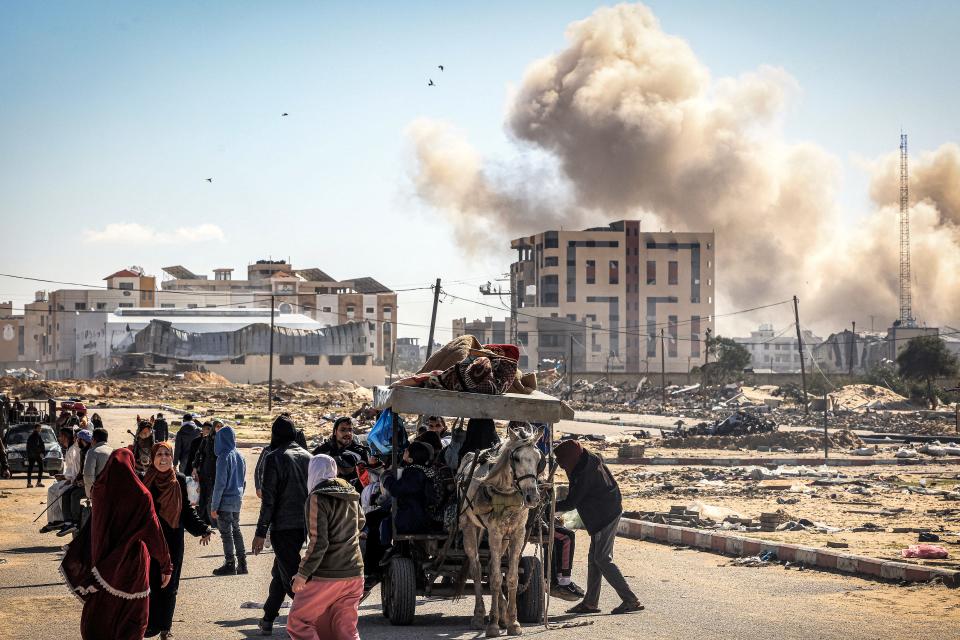Hamas Instagram post indicates fracture in resolve and its unwillingness to compromise
On Jan. 21, Hamas took to Instagram, releasing a bilingual document in English and Arabic listing its five reasons for launching its onslaught against Israel during the wee hours of Oct. 7:
Its need to combat Israel's alleged plan to erase the Palestinian cause,
Its responsibility to resist the “Judaization” of the land,
Its undertaking to challenge Israel's claim to Jerusalem’s sacred sites,
Its goal of lifting the siege on the Gaza Strip, and
Its mission to establish an independent Palestinian state.
As a side note, Hamas denied the atrocities its operatives committed against Israeli civilians as “Israeli lies.”
Two aspects of this document stand out: its tone and its omission of Palestinian prisoners. The document takes an apologetic tone, not because Hamas is distressed by its actions, but rather to deflect international and Arab criticism for the Oct. 7 atrocities and the subsequent devastation brought to Gaza by the Israeli response.
Over the last week alone, we’ve seen oil-rich Arab nations falter on whether to fund the rebuilding of Gaza, with some saying that they would only participate in funding the reconstruction on their terms (security, statehood and democracy), something not meant to serve as altruistic for the Palestinian cause, but rather to protect their investment, so that radical elements cannot once again take control of Gaza and launch a war with Israel that leads to the destruction of infrastructure and property at the scale we are currently seeing.

Secondly, the document conspicuously omits the release of Palestinian prisoners as a motive for launching this war. This omission raises questions, given Hamas's repeated emphasis that it is committed to releasing all Palestinian prisoners as part of any agreement to end the war and return the Israeli hostages it holds.
The Palestinian prisoners, being tried, convicted and incarcerated in Israel, hold a special political power play for Hamas, whose 2006 kidnapping of Israeli soldier Gilad Shalit led to a negotiated deal to release over 1,000 Palestinian prisoners in exchange for the single Israeli soldier. This achievement significantly boosted Hamas' political standing within the Palestinian movement and aided its rivalry with Fatah and the Palestinian Authority for Palestinian leadership.
Is there a new willingness to compromise?
In the aftermath of Oct. 7, and in the dialogues over the release of the Israeli hostages, Hamas leaders have constantly reiterated their demand for the release of all Palestinian prisoners. Does this omission in their recent declaration indicate a willingness to compromise on this issue? If so, why?
Hamas’ war strategy envisioned a triumphant and rapid outcome. At first, Hamas fighters would – en masse — invade Israel, killing or kidnapping all those in their path, regardless of whether they were military or civilian. In the aftermath, Hamas likely saw a fracturing of the Israeli spirit, possibly the country’s already conflicted government, and foment growing internal divisions within Israeli society.
Ultimately, Hamas would dictate the terms for the release of the hostages it held for all incarcerated Palestinian prisoners and also stay in power in Gaza and would thus emerge as the uncontested leader of the Palestinian people and a key regional power that could determine the trajectory of the Israeli-Palestinian conflict. These were some of the reasons Hamas launched this war on Oct. 7.
But Hamas strategists deeply misread the profound consequences of the war they started.
The atrocities committed by Hamas on Oct. 7 created an Israeli and international consensus that Hamas' rule in the Gaza Strip must come to an end. The atrocities, and their risk of reoccurrence, created a consensus within the Israeli populace that this goal must be achieved at any price.
With each passing day, Hamas' challenges are mounting. Under increasing military pressure from Israel, Hamas faces dwindling military assets and diminished control in Gaza and under increasing pressure from public opinion, Arab states — as well as Palestinians in Gaza — are becoming more vocal in their condemnation of the catastrophe Hamas has brought to Gaza. With that, Hamas' legitimacy as the governing authority of Gaza is waning.
More from Avi Melamed: Hamas is not a band of freedom fighters. They are terrorists — like ISIS and al-Qaida
More perspective: Hamas still holds my American son hostage in Gaza. Every day has been a living nightmare.
How will Hamas move forward?
Prioritizing its survival above all else, Hamas seems ready to compromise on the Palestinian prisoner issue, hoping that a gradual release of Israeli hostages might halt Israel's military operations and enable Hamas to regain and rebuild its rule in Gaza. Hamas leaders, in their determination to stay in power, have shown complete disregard for the lives and welfare of the people in Gaza.
Therefore, they will try to sophisticatedly package and market any compromise on the release of Palestinian prisoners as a tactic to ease Palestinian frustration and discontent over failing to release all the Palestinian prisoners as they had promised.
The Instagram post shows that Hamas’ goalposts for victory in this war have changed. Today, Hamas' primary objective is to reclaim the relevance it had on Oct. 6. However, this goal conflicts with a growing consensus among key international actors and a silent consensus among leaders of major Arab nations—Egypt, Jordan, Morocco, Saudi Arabia, and the United Arab Emirates. They are united in their desire to terminate Hamas' rule in Gaza and curb its radical influence.
The days ahead will reveal how Hamas navigates these turbulent waters as it confronts an increasingly challenging reality that its goal to emerge as the clear and undisputed victor in this war is fading away.
Avi Melamed is a former Israeli intelligence official who went on to serve as deputy and then as senior Arab affairs adviser to Jerusalem Mayors Teddy Kollek and Ehud Olmert, operating as a negotiator during the first and second intifadas. He is the author of "Inside The Middle East | Entering A New Era,” and his latest docuseries, “The Seam Line,” available on the IZZY streaming platform, focuses on Jerusalem’s flashpoints and his work during the intifadas.

This article originally appeared on NorthJersey.com: Israel war: Hamas Instagram post may indicate a decline of resolve

